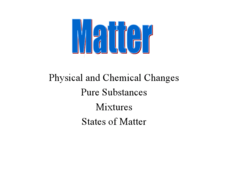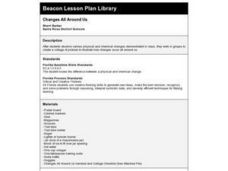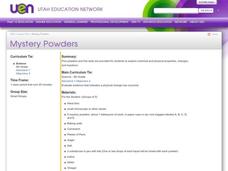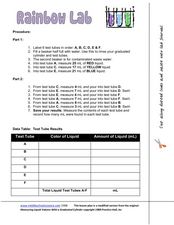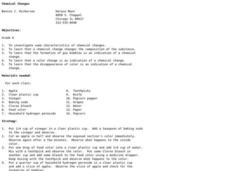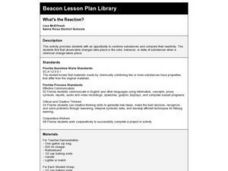Curated OER
Matter
In a neat and straightforward manner, this PowerPoint delivers basic introductory information on the properties of matter, physical and chemical changes, and pure substances vs. mixtures. It also defines the states of matter. For some...
Curated OER
Water 1: Water and Ice
Students explore the states of water. In this science lesson plan, students use observation, measurement, and communication skills to describe water as it changes from a solid to a liquid.
American Chemical Society
Evaporation
This is one in several lessons that explore the relationship between temperature and phase changes of water. After some discussion, elementary physical scientists place wet paper toweling on a hot and a room-temperature water bag and...
Curated OER
Changes All Around Us
Sixth graders, in groups, observe the difference between physical and chemical changes and create a collage of pictures to show the difference.
Curated OER
Heat Loss and Gain in Physical Changes and Chemical Reactions
Students measure the heat of physical and chemical changes in reactions. In this chemistry lesson students determine at what extent changes emit or absorb heat.
Curated OER
How to identify a physical change from a chemical change
Learners identify the difference between some physical and chemical properties and compare some physical and chemical changes. They design an experiment to distinguish between a physical or a chemical property of their choice.
Curated OER
Typical Conceptual Questions for Physics I - Heat
This worksheet would make a nifty quiz on the laws of thermodynamics. Nine multiple choice questions assess high schoolers' understanding of energy transfer, specific heat capacity, phase change, fusion, and vaporization. It is short but...
Curated OER
Water Cycle
Identify and interpret the earth's different water sources. Third and fourth graders describe and demonstrate the process of the water cycle, make a model of its two main parts, and predict and infer to answer questions about the model.
Curated OER
Water Pressure Blaster
Third graders complete an experiment to introduce them to the concept of water pressure. In this water pressure lesson plan, 3rd graders create pressure in a water bottle and observe the force of water that is created.
Curated OER
Amounts of Dissolved Oxygen in Various Bodies of Water
Students test water to determine the dissolved oxygen content while displaying the proper use of testing instruments while visiting water testing sites. They determine if the amount of dissolved oxygen is appropriate for the tested...
Curated OER
Rock Candy
Fourth graders observe and demonstrate the physical change of dissolving sugar in water and evaporating the water to examine the physical change that has occurred. They discuss physical changes and solutions, and make rock candy,...
Curated OER
Changes in Nature
Fifth graders explore changes in nature. They identify chemical and physical changes in the water cycle, carbon cycle, and weathering. Students explore a chemical or physical change based on a chemical formula. They examine the effects...
Curated OER
Classification of Changes
In this classification of changes worksheet, students identify each example as either chemical or physical changes. Students also classify other examples as either element, compound, solution, colloid, or suspensions. In the other...
Curated OER
Chemistry: Changing Materials
Students examine physical change with different temperature and solvents. In this elements and compounds lesson, students conduct experiments to discover what happens to the mass of a substance when is undergoes a physical change.
Curated OER
Mystery Powders
Fifth graders evaluate the physical properties of 5 powders. Each powder is subject to different conditions. They describe each observation as with a chemical change or a physical change.
Curated OER
Rainbow Lab
In this mixtures worksheet, students experiment with different amounts of solutes and solvents to make solutions. They observe color changes and look for chemical and physical changes in the test tubes. Students answer 5 questions and...
Curated OER
Burning vs. Heating
Students investigate burning vs. heating and observe the differences. In this burning vs. heating lesson plan, students observe a wooden splint burning and a piece of glass tubing being heated. They answer questions to compare the two...
American Chemical Society
Changes Caused by Heating and Cooling
It's heating up—and cooling down—in here! A hands-on lesson allows learners to experiment with melting and freezing butter to observe changes as a substance transitions between liquid and solid form. They also view an animation that...
Curated OER
Water and Ice
Students explore the physical properties of water. In this water lesson, students explore water as it changes states. They observe, measure and use communication skills to describe change.
Curated OER
Chemical Changes
Sixth graders explore chemical and physical changes. In this lesson about chemical changes, 6th graders observe various items and changes that occur at certain times. Students determine what change took place and observe the change....
Curated OER
Matter - Chapter 2 Physical Changes
In this matter worksheet, students identify words and match them to their definition. Students identify words dealing with matter, its physical changes, and the effect of heating and cooling matter. This worksheet contains nine...
Curated OER
Physical and Chemical Changes
Students observe examples of physical changes that can take place between the three states of matter and develop common sense and intuition in distinguishing between chemical and physical changes. They observe diagrams on the board from...
Curated OER
Changes in Nature
Fifth graders identify the chemical and physical changes in the water cycle, carbon cycle, and the effects of weathering. They analyze the periodic table, and observe how vinegar reacts with limestone in a chemical reaction that causes...
Curated OER
What's the Reaction?
Students combine baking soda and vinegar and observe the chemical and physical changes that this mixture can produce.


